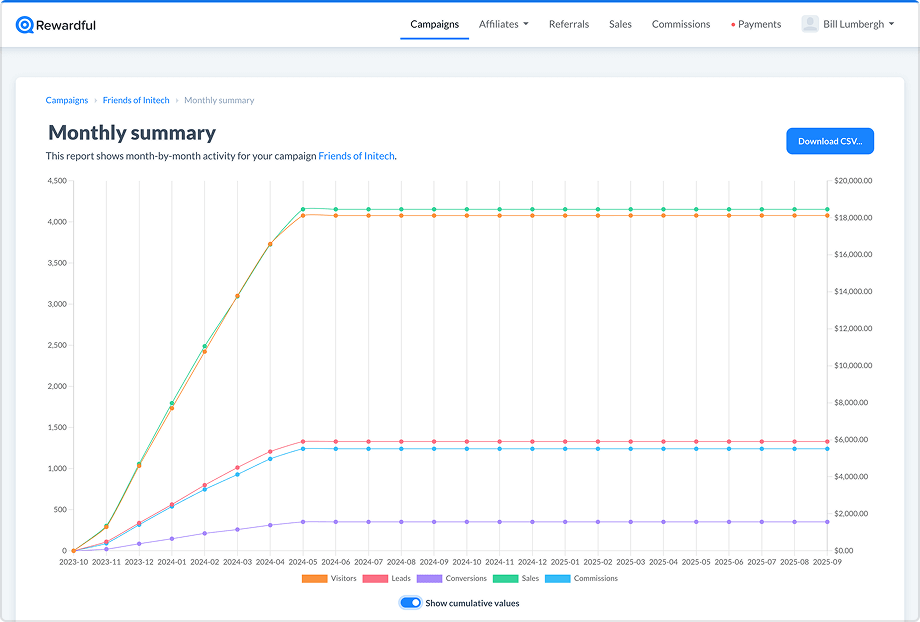Building a thriving affiliate program is a long-term investment that demands consistent effort and strategic management.
Over the years of helping countless B2B SaaS businesses launch and manage affiliate programs, I've seen both spectacular successes and frustrating failures.
What sets top-performing and struggling affiliate programs apart?
Based on my experience, five key factors influence an affiliate program's success—and today, I’m sharing them with you.
If you prefer video, here's epsidode 1 of Pastel Talks summarizing most of these lessons.
1. Solid Product-Market Fit (PMF) Drives Affiliate Program Success
The first key factor in building a highly-performing affiliate program is creating a product that perfectly satisfies the needs of a particular market, also known as achieving product-market fit (PMF).
The reason is simple: if nobody wants what you're selling, affiliate marketing won't significantly impact sales.
That is why having strong PMF is essential for both business growth and affiliate program success.
My experience shows that businesses with solid PMF have a clearer understanding of their target audience, ideal affiliates, and effective promotional strategies. This allows them to navigate challenges more effectively than those without a defined product-market fit.
Now, you may already have defined your PMF at the early stage of your SaaS business growth, but I encourage you to revisit it again to ensure that the values are still true.
For instance, if you own an AI-based video editing SaaS business and are considering launching an AI affiliate program, ask yourself the following questions:
Who is your target audience?
- Are you still targeting social media influencers, or have you expanded your market to other industries, like SaaS companies?
- Are you still focused on the US market?
- Is your primary target audience still micro-influencers?
What is your value proposition?
- Does your product still specialize in transforming long videos into shorts, or have you shifted towards all-in-one video editing software?
- Can your product also edit audio files?
- What are your product's most popular features? How do they impact sign-ups, recurring revenue, and brand awareness?
2. The Best Affiliate Programs Are Actively Managed
One fundamental thing I want to clarify about affiliate marketing is that it isn't a set-and-forget channel. It's a hands-on endeavor requiring constant attention and care.
What does this mean?
First, you have to put in the work before seeing results.
While launching an affiliate program might seem like the first step to effortless sales, the reality is different.
Even with a thriving affiliate network, expecting affiliates to appear and generate revenue without your effort magically is unrealistic. Consistent effort, such as actively recruiting affiliates, is essential to maintaining momentum and maximizing the affiliate program's potential.
Second, think of your affiliates as your remote sales team. Nurturing these relationships is vital for long-term success. If you neglect them, they're likely to forget about you.
Conversely, consistently investing in your affiliate program can lead to exponential growth.
This means providing fresh marketing materials, product updates, and training.
Exclusive perks like beta testing or joint marketing campaigns can also be beneficial. Open communication is key. Regular check-ins, dedicated channels, or even a community platform can foster strong relationships.
And let's not forget about quality control. Pruning your affiliate base by removing underperforming or rule-breaking partners is essential for maintaining a healthy program.

“Experience has shown that affiliates really appreciate it if you share product updates (turn them into frontrunners for content production to build hype for new updates), new feature releases (e.g. beta testing for super relevant affiliates to emphasise benefits for users), provide CRM insights on the quality of their conversions (so they can optimise their content and audience stragies accordingly), jump on periodic calls to discuss the program and have some banter (this builds strong relationships over time), and last but not least; keep providing them with promotional materials tailored to their specific audiences (for maximum relevancy and impact).”
Ishtvan Torpoi (That Affiliate Guy), Owner of TAG® Affiliate Marketing Agency
Top tip: Discover 5 creative products for affiliate marketing collaboration.
3. Set Realistic Expectations
As mentioned before, building a thriving affiliate program takes some time. Expect setbacks and challenges along the way.
Those who persevere through these initial hurdles often reap the greatest rewards.
That's why it's crucial to temper expectations for rapid growth. Here's a general timeline outlining the expected growth of a SaaS affiliate program.
Of course, results can vary between businesses.
- Months 1-3: typically dedicated to program foundation and affiliate recruitment.
- Months 4-6: focus on refining affiliate program strategies and experimenting with new promotional ideas. You’ll start to see a gradual increase in affiliate sign-ups and sales.
- Months 6-12: involve expanding outreach and nurturing deeper relationships with your top affiliates. As more affiliates join, they bring in more revenue.
- Months 12 and more: focus on affiliate retention and exploring new affiliate channels. Your affiliate revenue stream should reach a stable growth state.

"Strategic optimization with your partners is key to the success of your program in its first year. While the temptation may be to send mass emails and accept all affiliates, focusing on quality over quantity is essential for sustainable growth. Remember, success in an affiliate program is a marathon, not a sprint. Allow the necessary time for development, and you will yield a higher return on investment."
Nancy Harnett, Head of Affiliate Marketing at HubSpot
4. Optimized Sales Funnels Turn Traffic into Sales
Now, let's say you've launched your SaaS affiliate marketing program, and some affiliates are sending you traffic.
That's great!
But getting traffic is just the beginning. The real work lies in converting those visitors into paying customers.
I won't delve into the specifics of optimizing your product and sales process.
However, I recommend checking a few key metrics:
- Visit-to-signup rates: if these numbers are low, examine your website's copy, design, and overall user experience.
- Signup-to-paid rates: low numbers here indicate potential issues with your product, onboarding, pricing, or value proposition.
- Churn rates: a high churn rate suggests that customers aren't finding ongoing value in your product.
Keep in mind that if your product doesn’t resonate with the market needs, having a strong affiliate program won’t boost your sales. This is why having solid product-market fit (PMF) is crucial from the start.
5. Large Numbers of Affiliates Don't Always Guarantee Success
Another common misconception about affiliate marketing is that more affiliates equals more revenue.
Unfortunately, it's not always that simple. I've seen countless cases where businesses have a large affiliate base but minimal sales.

“The most successful programs focus on affiliates that convert not on the task of gathering large databases of partners that never send a single sale. If you really want to get clever with your program performance early on invest time with partners that show interest and have the traffic and data that can match to your product or niche. One of the most successful programs I ever ran started with just 50 good partners - and every year it continued to grow as they did!”
Lee-Ann Johnstone, Founder of Affiverse
Instead, I've learned that a small group of dedicated affiliates can outperform a large pool of casual promoters.
Why?
Most affiliates fall into two categories: aspirational tire kickers who join but never truly engage and those looking for a quick buck.
Focusing on a smaller group of dedicated affiliates is generally more effective.
Remember, a small number of affiliates will send 99% of your results. Identify who they are and provide them with the support and resources they need to succeed. That’s how you build lasting partnerships and generate higher returns.
Every Successful Affiliate Program Needs Powerful Affiliate Software
Building a successful affiliate program requires more than just setting it up and hoping for the best. It demands ongoing management.
Consider using affiliate management software like Rewardful. It's a great option for SaaS businesses, offering features like custom commissions, bulk payments, and link and coupon code tracking.
Want more affiliate marketing insights?
Dive into our collection of blogs and guides for inspiration and expert tips.














